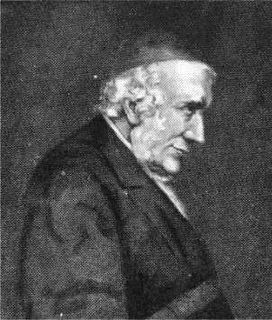A Quote by Maharishi Mahesh Yogi
Like the air, God's Grace is available to us. It is permeating every fibre of Being and the Being of the entire universe. When we take our attention to that Being, finer than the finest, then we establish ourselves on the level of God's Grace. Immediately we just enjoy. Life is Bliss!
Related Quotes
It is grace at the beginning, and grace at the end. So that when you and I come to lie upon our death beds, the one thing that should comfort and help and strengthen us there is the thing that helped us in the beginning. Not what we have been, not what we have done, but the Grace of God in Jesus Christ our Lord. The Christian life starts with grace, it must continue with grace, it ends with grace. Grace wondrous grace. By the grace of God I am what I am. Yet not I, but the Grace of God which was with me.
We live in a church culture that has a dangerous tendency to disconnect the grace of God from the glory of God. Our hearts resonate with the idea of enjoying God's grace. We bask in sermons, conferences, and books that exalt a grace centering on us. And while the wonder of grace is worthy of our attention, if that grace is disconnected from its purpose, the sad result is a self-centered Christianity that bypasses the heart of God.
This is the amazing story of God’s grace. God saves us by His grace and transforms us more and more into the likeness of His Son by His grace. In all our trials and afflictions, He sustains and strengthens us by His grace. He calls us by grace to perform our own unique function within the Body of Christ. Then, again by grace, He gives to each of us the spiritual gifts necessary to fulfill our calling. As we serve Him, He makes that service acceptable to Himself by grace, and then rewards us a hundredfold by grace.
[Grace] is given not to make us something other than ourselves but to make us radically ourselves. Grace is given not to implant in us a foreign wisdom but to make us alive to the wisdom that was born with us in our mother?s womb. Grace is given not to lead us into another identity but to reconnect us to the beauty of our deepest identity. And grace is given not that we might find some exterior source of strength but that we might be established again in the deep inner security of our being and in learning to lose ourselves in love for one another to truly find ourselves.
Augustine said that we were all born into the world of "common grace" [i.e., available to all]. Before one is baptized, or even if one never is, such grace meets one in God's creation. There is grace in the pear tree that blooms and blushes. There is common grace in the sea (that massive cleanliness which we are proceeding to corrupt), in the fact that there was, before we laid hands on it, clean air. Our task is to appreciate that grace.
Though we are commanded to 'wash ourselves', to 'cleanse ourselves from sins', to 'purge ourselves from all our iniquities', yet to imagine that we can do these things by our own efforts is to trample on the cross and grace of Jesus Christ. Whatever God works in us by his grace, he commands us to do as our duty. God works all in us and by us.
Take steadily some one sin, which seems to stand out before thee, to root it out, by God's grace, and every fibre of it. Purpose strongly, by the grace and strength of God, wholly to sacrifice this sin or sinful inclination to the love of God, to spare it not, until thou leave of it none remaining, neither root nor branch.
The grace of God means something like: Here is your life. You might never have been, but you are because the party wouldn't have been complete without you. Here is the world. Beautiful and terrible things will happen. Don't be afraid. I am with you. Nothing can ever separate us. It's for you I created the universe. I love you. There's only one catch. Like any other gift, the gift of grace can be yours only if you'll reach out and take it. Maybe being able to reach out and take it is a gift too.
Through the Holy Spirit comes our restoration to paradise, our ascension into the kingdom of heaven, our return to the adoption of sons, our liberty to call God our Father, our being made partakers of the grace of Christ, our being called children of light, our sharing in eternal glory, and, in a word, our being brought into a state of all "fulness of blessing," both in this world and in the world to come, of all the good gifts that are in store for us, by promise hereof, through faith, beholding the reflection of their grace as though they were already present, we await the full enjoyment.
The love of God is not taught. No one has taught us to enjoy the light or to be attached to life more than anything else. And no one has taught us to love the two people who brought us into the world and educated us. Which is all the more reason to believe that we did not learn to love God as a result of outside instruction. In the very nature of every human being has been sown the seed of the ability to love. You and I ought to welcome this seed, cultivate it carefully, nourish it attentively and foster its growth by going to the school of God's commandments with help of His grace.
The duties God requires of us are not in proportion to the strength we possess in ourselves. Rather, they are proportional to the resources available to us in Christ. We do not have the ability in ourselves to accomplish the least of God's tasks. This is the law of grace. When we recognize it is impossible for us to perform a duty in our own strength, we will discover the secret of its accomplishment.
Perhaps the most difficult task for us to perform is to rely on God’s grace and God’s grace alone for our celebration. It is difficult for our pride to rest on grace. Grace is for other people—for beggars. We don’t want to live by a heavenly welfare system. We want to earn our own way and atone for our own sins. We like to think that we will go to heaven because we deserve to be there.







































